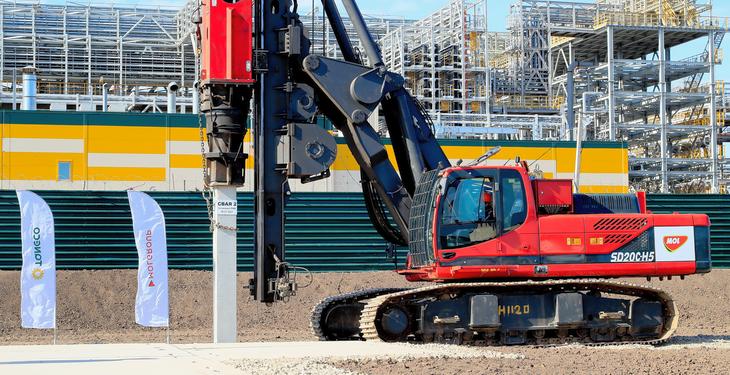MOL and Tatneft, one of the largest oil and gas companies in Russia, have solemnly launched a joint project for a rubber bitumen plant in the Republic of Tatarstan. The companies have also agreed to establish a joint venture that, besides manufacturing and selling rubber bitumen, will also be authorized to market MOL’s technology license in the Commonwealth of Independent States. The investment is partly financed by the Hungarian Export Development Agency’s (HEPA) tender funding.
Péter Szijjártó, Minister of Foreign Affairs and Trade of Hungary, Rustam Minhihanov, President of the Republic of Tatarstan and Chairman of the Board of Directors of Tatneft, and Nail Maganov CEO of Tatneft and Member of the Board of Directors of Tatneft, solemnly launched the construction of the joint rubber bitumen plant between MOL and Tatneft. The investment will be housed by Tatneft’s TANECO refinery, which operates in the Republic of Tatarstan, in the town of Nizhnekamsk, about 1,000 kilometers from Moscow. The plant, with a production capacity of about 20,000 tons per year, will be a joint plant of MOL and Tatneft, but this is only the first step in the cooperation of the two companies. MOL and TANECO, a subsidiary operating the Tatneft refinery, have also agreed to establish a joint venture (RMB-RUSS LLC) in which MOL will have a 51% majority. The purpose of the joint venture is to build the plant using MOL’s rubber bitumen technology, to produce and sell rubber bitumen, and to market MOL’s technology license in the Commonwealth of Independent States. The plant in Tatarstan, as well as future investments in the region will utilise the proven rubber bitumen technology extensively tested at MOL’s refinery in Zalaegerszeg, and MOL will provide the knowledge and expertise to run the plant, in form of a license. The raw bitumen and rubber grind will be provided by TANECO, while the special modifier manufactured by MOL LUB will be supplied by MOL.
The investment will be financed by the partners in proportion to their share in the company. The project is also funded by the Hungarian Export Development Agency (HEPA) managed by the Ministry of Foreign Affairs and Trade, providing about 50% of the investment costs.
The cooperation is in line with MOL Group’s updated 2030+ SHAPE TOMORROW strategy, as the company sees the future in kickstarting circular economy, and the rubber bitumen technology developed together with the University of Pannonia provides a great example for prolonging the life span of used products. Besides sharing the technology, MOL Group will support the new Tatar unit with the actual operational experience of the rubber bitumen plant in Zalaegerszeg which has been operating since 2012.
“We are proud to work with such a strong and technologically advanced partner. Our joint project provides a single solution for several important tasks: it contributes to the improvement of road quality, efficient waste recycling and CO2 emission reduction. We will be producing quality products providing an answer to modern challenges in the new site” – said Nail Maganov, CEO of Tatneft.
“It always fills me with pride to see the knowledge and success of the Carpathian Basin bolstering other nations, as well. The rubber bitumen technology developed by researchers of MOL and those of the University of Pannonia will now also help the people of the Commonwealth of Independent States to boost circular economy by recycling used tires previously regarded as waste as raw materials. As for our hopes, there are great business opportunities in this region, but our cooperation also serves sustainability objectives in addition to making profit. Although we live thousands of kilometers apart, we must answer ecological problems the very same way” – evaluated the cooperation Oszkár Világi, MOL Group Chief Innovation Officer and Member of the Board of Directors of MOL Group.
The rubber bitumen plant in Nizhnekamsk is MOL Group’s first Downstream (hydrocarbon processing and trading business) cooperation in the Commonwealth of Independent States. The Hungarian corporation has been present in the region for several decades, but so far it has mainly carried out Upstream (hydrocarbon exploration and production) activities locally.
